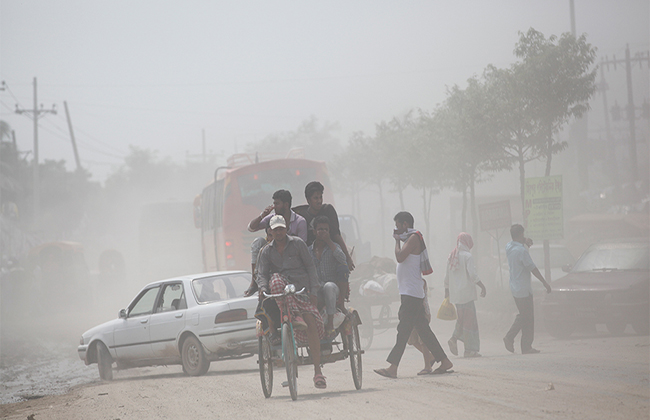
The densely populated capital of Bangladesh has once again been rated as the world’s most polluted city.
On Thursday, Dhaka’s air quality index (AQI) around 11 am read 367, considered ‘hazardous’. Indian capital Delhi and Pakistan’s Lahore occupied the second and third spots in the list of cities with the worst air quality, with AQI scores of 358 and 215, respectively.
An AQI between 201 and 300 is considered ‘poor’, while a reading of 301 to 400 is said to be ‘hazardous’, posing serious health risks to city residents.
AQI, an index for reporting daily air quality, is used by government agencies to inform people how clean or polluted the air of a certain city is, and what associated health effects might be a concern for them.
In Bangladesh, the AQI is based on five criteria pollutants — Particulate Matter (PM10 and PM2.5), NO2, CO, SO2 and Ozone.
Dhaka has long been grappling with air pollution issues. Generally, the capital’s air starts getting fresh when monsoon rains begin from mid-June.
In February last year, Bangladesh’s Environment, Forests and Climate Change Minister Md Shahab Uddin attributed the “extreme” air pollution levels in Dhaka to uncontrolled discharge of dust from construction projects, smoke from vehicles and brick kilns.
Besides, on January 31, the High Court directed the authorities concerned to shut down all illegal brick kilns by February 18.
Air pollution consistently ranks among the top risk factors for death and disability worldwide. Breathing polluted air has long been recognised as increasing a person’s chances of developing heart disease, chronic respiratory diseases, lung infections, and cancer.
As per the World Health Organization (WHO), air pollution kills an estimated seven million people worldwide every year, largely as a result of increased mortality from stroke, heart disease, chronic obstructive pulmonary disease, lung cancer and respiratory infections.
Over 80 percent living in urban areas which monitor air pollution are exposed to air quality levels that exceed WHO guideline limits, with low- and middle-income countries most at risk.
Covid-19 and Air Pollution
Experts say that exposure to higher levels of air pollution weakens people’s respiratory and immune systems, making them more susceptible to Covid-19.
The World Health Organization (WHO) recently urged cities with a higher level of air pollution to reinforce their preparedness against the deadly corona pandemic.
Experts have also underscored the need for the use of masks in order to protect people from pollution as well as Covid-19.
